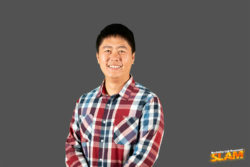
Fanchao Song of Arkin Lab was selected to compete in Berkeley Lab “Early Career Scientist and Research SLAM.” Here is his presentation from the SLAM “I am a Bubble Player,” which was selected from a competitive field of 42 entries. This is the “3-minute-describe-your-work-in-layman-terms” challenge that Berkeley Lab is hosting for postdocs. Finalists receive coaching via “Making the Most of Your Presentation” workshop, a unique opportunity to get one-on-one feedback from a globally renowned speaker, Jean-Luc Doumont of Principiae. Finalists had a chance to win a $3,000 first prize! You can read more about the results https://slam.lbl.gov/
He shares his experience, to encourage other team members to participate!

How did you initially hear about the SLAM?
I heard about SLAM when the lab called for the participation on SLAM2018. I read the instructions and felt it is interesting. I submitted a video last year but did not get into the finalists. That made me start thinking about how to do it better.
When did you decide to submit an entry, and what did that entail?
As I started improving on how to do a short scientific talk after my previous attempt, Lauren’s great talk inspired me a lot. Thus I did not hesitate to submit a recording this time. There are two steps in this SLAM. First, people were encouraged to submit a 3-minutes talk to describe their research. The judges from different backgrounds in the Lab reviewed all the submissions and selected 12 submissions as the finalists. All the finalists were informed and prepared for 3-minutes on stage talk in the SLAM final as people saw.
What did you get out of the experience?
This was definitely an awesome experience. I learned a lot about public speaking and started to notice some of my habits of talking, gestures, and expressions. This is the first time I recorded and listened to myself talk. It was weird but really helpful with recognizing a few things I had not realized before. For example, I found that I frequently speak fast and slur some words. And that I always step back and forward during talking. In addition, the feeling of talking in front of hundreds of people is totally different from talking in front of a camera or mirror. The stage performance is more about the overall feeling I create but not exact words. It is a package of content, gesture, body movement, eye contact, speed, rhythm, etc. The preparation of SLAM forced me to think about everything in detail and also the overall feeling. Besides this, I made lots of friends and got my research exposed in the whole lab. All the finalists got together one day before the final performance to rehearse, we had a really good time, made jokes, and gave feedback and suggestions on others’ talks. We did not consider the SLAM as a competition but a party.
What would you do differently?
There are three things I am going to do differently for future talks. First, practice more. I feel I practiced the content well this time. But there is huge room for improvement on how to coordinate my gestures, movement, expression, eye contact together with my speaking, in particular, changing some habits. Second, smile. I was too serious when I was talking. I wrote “smile” on the top of my document during preparation, but it seemed like I forgot to do this. Third, slow down, and use different pacing in various parts of my talk based on content.
